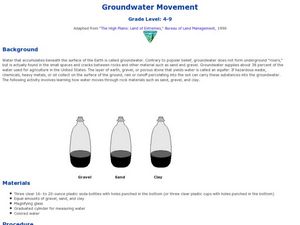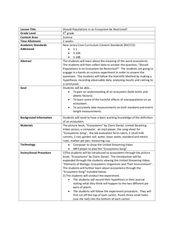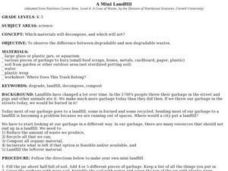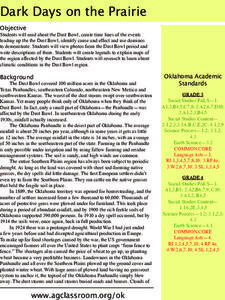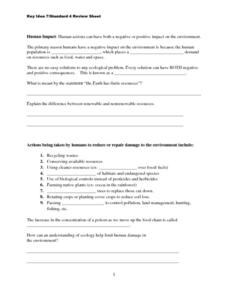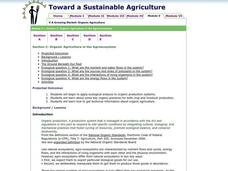Curated OER
Weather Lesson 1
Students describe and compare the layers of the atmosphere. They explain how to measure the temperature of the atmosphere. They also explain what causes the atmosphere to heat up in some places more than in others.
Curated OER
Building on the Land
Ninth graders study how cities affect the environment and design an ecologically-sound city. They focus their study on the benefits and constraints of life on the Northern Great Plains.
Teach Engineering
Fairly Fundamental Facts About Forces and Structures
Don't twist and turn looking for a resource. The first installment of a six-part series teaches young engineers about the five fundamental forces of compression, tension, shear, bending, and torsion. These forces help explain different...
Curated OER
Describe Environmental Interrelationships
Students describe environmental interrelationships using list of criteria. They are able to explain organism interaction, based on definitions provided. Also, students can use references and worksheets, to describe effects of pollution...
Curated OER
Properties of Liquids
Students describe properties of liquids and use descriptive language as a springboard to develop precise vocabulary for properties of liquids. They also use vocabulary as practiced with liquid-vocabulary card games. Finally, students...
Curated OER
Groundwater Movement
Students study groundwater movement beneath the surface of the Earth. In this agriculture lesson, students experiment with how water moves through rock materials such as sand, gravel, and clay.
Tech Coach Corner
Understanding Sentences
Go over how to read complex sentences. Learners work on identifying key ideas, examining sentence structure, looking up new vocabulary, and paraphrasing. An overview of methods to help class members read difficult texts, half of the...
Curated OER
Hoot: Vocabulary: Magic Squares
Define words with numbers in a fun vocabulary activity. Using words from Hoot by Carl Hiaasen, learners use a grid to match words and their definitions, and to find the magic number that is the same when the numbers are added from...
Curated OER
How Many Hats Does a Farmer Wear
In this farmer worksheet, students make a spinning wheel to describe the jobs of a farmer. Students create 1 wheel with 8 different jobs for a farmer.
Curated OER
Should Populations in an Ecosystem be Restricted?
Fourth graders experiment to determine how overpopulation effects ecosystems specifically plants. In this ecosystem activity, 4th graders conduct an ecosystems experiment after listening to Claire Daniel's, Ecosystems. They watch a...
Curated OER
Talkin' Trash (All About Landfills)
Students investigate the types of waste created by people and identify various options for trash disposal. They read and discuss a handout about what a landfill is and the different types of trash, match types of trash with the proper...
Curated OER
Let's Make a Compost Cake
Students create a compost cake. In this gardening and decomposition science lesson, students review and describe the "nutrient cycle." Students create a compost pile, measure and record the dimensions and temperature of the pile, and...
Curated OER
A MINI LANDFILL
Students observe the difference between degradable and non-degradable wastes. They create their own landfill in a jar by adding four or five pieces of garbage and then covering it with dirt and water. They make observations on what they...
Curated OER
Recycling
Third graders observe the importance of recycling. In this environmental instructional activity, 3rd graders will view experiments on water filtration, paper-making, and breathing pollutants, and will categorize recyclable materials.
Curated OER
Dark Days on the Prairie
Fourth graders research the location and causes of the Dust Bowl in 1935. In support, they interpret photos from that period in Oklahoma history, They also compare/contrast the American Dust Bowl to the dust storms that occurred in...
Curated OER
Amazing Grazing: Keeping Our Ecosystem Running
Students discover the value of sustainability within our ecosystem. In this ecological lesson, students discuss the importance of a food cycle in our society, and how humans can improve the conservation of a healthy ecosystem. Eventually...
Curated OER
"Web of Life" Game
Students relate members of an ecosystem by their interactions. In this ecosystem instructional activity, students toss a ball to other members of their group (each representing a member of an ecosystem) and tell how they are related to...
Curated OER
Guetemala's Changing Forest
Eighth graders compare their local ecological zone to the tropical rainforest. In this natural ecology instructional activity, 8th graders complete an activity about the differences in ecological zones. They compare their biome to the...
Curated OER
Worm Compost & Vermicomposting
Students explore vermicomposting, the species of worms needed and the proper climate for it. In this composting lesson students make their own worm compost bin.
Curated OER
Ecology of the Dump
High schoolers determine which types of garbage are biodegradable and which are nonbiodegradable. They practice measuring skills, hypothesizing, taking data, and writing a lab report. Students observe the relative biodegradability of...
Curated OER
Hazardous Waste Cleanup Methods
Students examine how hazardous wastes are cleaned up. They work together to identify the positives and negatives of cleaning up certain hazardous wastes. They answer questions as part of the activity.
Curated OER
Building a Butterfly Garden
Students examine the habitat and life cycle of a butterfly. In this early childhood lesson plan, students identify the parts of a butterfly, as well as the stages of the butterfly life cycle. Students also plant a garden in which they...
Curated OER
Standard 4 Review-Human Impact
In this human impact on the environment worksheet, students fill in the blanks to complete sentences about how humans have negatively affected the environment. They complete sentences about the actions taken to reduce and repair the...
Curated OER
Toward a Sustainable Agriculture
Students analyze organic production systems. In this organic agriculture lesson, students examine key organic practices for both crop and livestock. This lesson includes 5 different activities, 4 critical thinking questions and...







